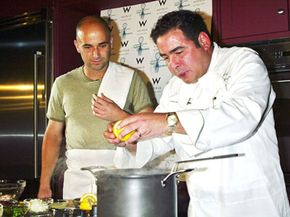Working in a restaurant or catering kitchen isn't what it was 20 years ago. One of the big reasons is the popularity of television's Food Network. The all-food, all the time cable channel has grown a lot since its debut in 1993, boasting 100 million subscribers in 2008 [source: Wheeling News Register]. Food Network chefs Emeril Agassi, Rachel Ray, Alton Brown, Bobby Flay and Paula Deen are culinary superstars. "Top Chef" judge Tom Colicchio already had his successful Craft restaurants and was well-known in the culinary community, but it was his jump to television that made him a household name. The reality show set a personal record with 2.7 million viewers tuning in for the season five debut episode [source: Huffington Post].
Food Network and other cooking shows have made cooking cool. TV chefs are rock stars -- funny, personable and wealthy. Home chefs are tantalized with the fame and fortune that awaits a successful chef when they tune in each day. The life of a chef isn't quite as glamorous as it appears to be, though. Fame and fortune only await the best chefs. The restaurant business is risky and fraught with horror stories of failure and bankruptcy. Working as an executive chef is an all-consuming endeavor. There's no such thing as a 40-hour week or weekends off. It's physically demanding and stressful. Cooking is only a small part of the daily life of a chef. Kitchen management, scheduling, menu planning, food ordering and the hiring, firing and training of staff are just a few of the responsibilities of an executive chef.
Advertisement
All those factors aside, many people still have designs on a career as a chef. It's hard work, but if you're successful, it does pay off. Respect, notoriety and wealth could be in your future if you're talented, passionate and work really hard. There isn't just one road to culinary success. If you want to become a chef, you have some decisions to make about your approach. We'll break it down for you on the following pages.







